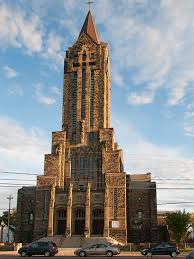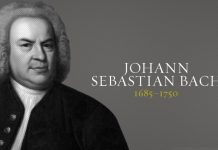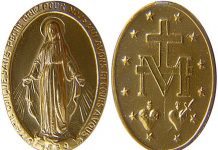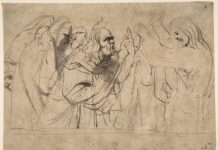
I’m not sure how one might describe the decision of Archbishop Valery Vianneau, spiritual head of the diocese of Moncton in New Brunswick, to restrict entrance to any parishes and all diocesan property to the ‘double vaccinated’ – and this apparently includes not only Mass, but all the other sacraments, and even catechesis and any meetings. Unclean! Unclean! The bishop cites state mandates in his draconian decree.
Douglas Farrow does not hold back in his criticism, to come into effect September 22nd, the same day as the ‘vaxx-pass’ here in Ontario. Whatever words one might use – and one may be at a loss for them – we are certainly in uncharted waters here. As Dr. Farrow points out, Covid has taken 0.006% of the population of the diocese to eternity. Hence, it is a grave danger to a small minority, but is this grounds for denying the very life of the Church to those who exercise their natural and God-given right to choose not to be vaccinated, or even those who have natural immunity? (With mounting evidence that this is more effective and far safer than the controversial and still experimental vaccine). Even in the midst of the 14th century Black Death, which took 50% of the population of many villages, most of those within a day of infection, victims were still given the sacraments, which is why so many sacrificial priests themselves died from the plague. And such practice continued in the various other pestilences and pandemics right up to, well, the era of covid.
This is the end point of the new Erastianism, a submission of the Church to the diktats of the State. Dioceses and parishes on the east coast have been moribund for some time now, selling off property to stay afloat, mired in liberalism, modernism, and various other scandals and aberrancies, which is why the bishop’s decision may well be an unwitting divine quasi-interdict from God Himself, a wake-up call, and a time for purification. Perhaps we need to send missionary priests into the diocese, and to any others that follow suit, to offer the sacraments underground, so to speak, as in Elizabethan England, circa, say, 1570 to 1680. Ite missa est!
We will have more to say on the Pope and these vaccine mandates and restrictions, already creeping even into the Vatican. Un-vaxxed pilgrims are still permitted to attend the sacraments, but no loitering and lingering for the novi leprosi, who will be escorted out as soon as the services are over.
Meanwhile, the Holy Father, in a meeting with Slovak Jesuits on September 12th – the Holy Name of Mary – lashed out at an unnamed ‘large Catholic news channel’ – clearly EWTN – that criticizes some of his decisions and policies, especially concerning the Latin Mass, claiming they are doing the ‘work of the devil’ (!). What must Mother Angelica be thinking, along with all of her Poor Clare Sisters praying away not far from that television station in Alabama?
I personally deserve attacks and insults because I am a sinner, but the Church does not deserve them. They are the work of the devil. I have also said this to some of them.”
Are even balanced criticisms of Francis’ policies, such as I would imagine EWTN offers – even though I am not a television watcher – now to be equated not only with ‘attacks and insults’, and such against the Church herself? Might not the Holy Father entertain the notion that such people might think that they are defending the Church and her Tradition from their perception of papal authoritative over-reach, one which we may hope is corrected in a future pontificate?
The Pope accuses those attached to, and attending, the traditional Latin Mass of ‘going backward’ and of ‘automatism’, which he does not define. We should remember that Liturgy is not so much our work for God, but God’s work for us. Hence, this work requires rubrics and a set order, not a ceremony made up as one goes along, dependent on priestly personalities and proclivities. We should know what we are going to get when we walk into a Catholic church.
And the Holy Father weighed shepherding those who do not follow the Church’s teaching, particularly on sexual and marital mores:
It frightens us to accompany people with sexual diversity. We are afraid of the crossroads and paths that Paul VI spoke of. This is the evil of this moment, namely, to seek the path in rigidity and clericalism, which are two perversions
We should be clear that, however people decide to act, there is no actual ‘sexual diversity’ except the one God intended, male and female, to be joined in holy matrimony. ‘Rigidity’ and ‘clericalism’ are left undefined and unspecified – floating condemnations (there it is again!) to drift into and unsettle the conscience of those trying to live out the divine and natural law, and help others do so. Is there not a danger here of leaving others to wallow in their sin, or, worse, become contumacious and hardened therein? There is a fine line between accompaniment and acquiescence, between proper pastoral care and complaisance.
While on the theme of Saint Matthew and Christ ‘eating with tax collectors, sinners and prostitutes’, someone mentioned to me that those who met the Truth Himself, and looked into the human eyes of the Second Person of the Blessed Trinity Incarnate, had a stark, and usually sudden, decision to make: Leave their sin and follow Him, or turn away in sorrow, or even in hatred. And that goes for all of us. As Christ Himself warned, ‘He who is not with Me, is against Me‘. And to those He healed spiritually, ‘Go, and sin no more‘.
I wouldn’t mind witnessing a debate on the different notions of accompaniment, say, between Saint Jean Vianney and Father James Martin, with Christ as moderator and judge. Come to think of it, that might actually happen someday…
We must pray for the Holy Father, for all of our bishops and priests. Pope Francis, sad to say, claims that in his recent hospital stay, some wished him dead and were already preparing for a new conclave, which may well be true, but not the most charitable of thoughts. I personally pray that he be given what time is within God’s holy will, not a moment more nor less, the same thing I pray for myself.
I wonder, might this be the Holy Father’s own conscience getting to him? Is he troubled that his Traditionis Custodes is having the opposite effect he may have intended, and is actually increasing interest and devotion to the traditional Mass? That young people want clear and precise teaching, not just on the sacraments, but the moral law, marriage and holiness? Might this be an opportunity for Francis to ponder and reflect on some of those ‘policies and decisions’, or at least the way in which they are expressed, with which some of us demur? In light of the feast of Saint Matthew, we should pray for that ongoing metanoia, conversion of mind and heart, for him and for all of us, on our pilgrimage to the fullness of truth, here, and into eternity.










